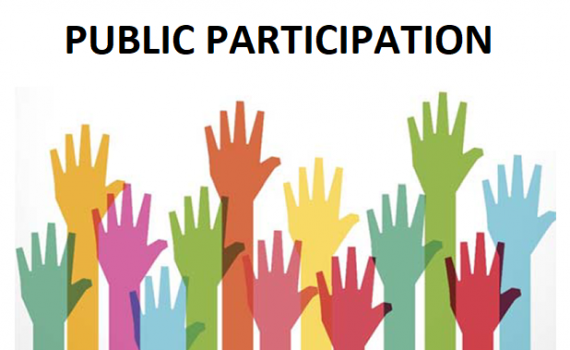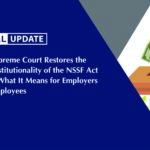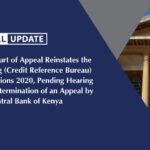Introduction
For a long time, the people of Kenya participated in governance indirectly through their representatives in Parliament. This position changed with the 2010 Constitution which for the first time recognized and mandated public officers as well as law making bodies to promote and facilitate public participation. While this can be applauded, its mere recognition has brought to the fore many legal questions. While the Constitution recognizes public participation, the same has not been defined, neither has there been enacted a legislation to provide for the persons responsible for public participation or the manner in which it is to be carried out. In the post-2010 dispensation, the burden has been placed on the courts to determine what public participation is. Indeed, the courts have declared many legislations unconstitutional for lack of public participation.
Legal Framework for Public Participation in Kenya
Article 1 of the Constitution provides that all sovereign power belongs to the people of Kenya who shall exercise it directly or through their democratically elected representatives. Under Article 10(2), the national values and principles of governance include public participation.
The state is under an obligation to encourage public participation in the management, protection and conservation of the environment under Article 69 (1) (d). Article 118, on the other hand requires Parliament to facilitate public participation and involvement in the legislative and other business of Parliament and its committees. The objects of devolution under Article 174 (c) include to give powers of self-governance to the people and enhance the participation of the people in the exercise of the powers of the State and in making decisions affecting them among others. Article 184 (1) (c) obligates Parliament to enact legislation which shall provide for the governance and management of urban areas and cities, and shall in particular, provide for participation by residents in the governance of urban areas and cities.
Article 196 (1) (b) requires county assemblies to facilitate public participation and involvement in the legislative and other business of the assembly and its committees. Further, public participation is among the principles of public finance under Article 201 (a). Article 232 provides for the values and principles of public service. Among the principles is the involvement of the public in the policy making process.
Judicial Interpretation of Public Participation
In the absence of a substantive law on public participation, attention has shifted towards the courts for interpretation of the concept. Perhaps the most exhaustive discussion on public participation in Kenya was done in the case of Republic v Independent Electoral and Boundaries Commission (IEBC) Ex parte National Super Alliance (NASA) Kenya & 6 Others (Al Ghurair case). The case challenged the decision of IEBC to grant Al Ghurair Printing and Publishing Company tender print election ballot papers. The main issue in contention was lack of public participation in the procurement process. The court quashed the decision of the IEBC to grant the tender award due to lack of public participation. It further stated that public participation is not a mere cosmetic venture or a public relations exercise. The High Court, in pronouncing itself on the importance of public participation, stated thus:
“…The people of Kenya did not intend that these provisions be merely suggestions, superfluous or ornamental; they did not intend to include these provisions as lofty aspirations. Kenyans intended that the said provisions should have substantive bite and that they will be enforced and implemented.”
How should public participation be conducted?
It follows then, how should public participation be conducted? In Robert N. Gakuru & Others v Governor, Kiambu County the court stated that public participation should not be treated as a mere formality for the purpose of fulfilment of the constitutional dictates. Moreover, it must not be equated with consultation.
The court in the Al Ghurair case cited with approval the case of Minister of Health v New Clicks South Africa (Pty) Ltd in which the South African Constitutional Court stated as follows:
“What matters is that at the end of the day a reasonable opportunity is offered to members of the public and all interested parties to know about the issue and to have an adequate say. What amounts to a reasonable opportunity will depend on the circumstances of each case.”
In the Matter of the Mui Coal Basin Local Community [2015] eKLR, the court set out the principles which both the court or public agency should use in order to determine whether public participation has been reached in a particular case. First, the agency should furnish a programme of public participation. The programme take into account the quantity and quality of the governed to participate in their own governance. Secondly, there is no single regime of public participation that can be prescribed. A variety of mechanisms can be used to achieve public participation. The only test the courts can use is the test of effectiveness. Thirdly, a public participation programme must include access to and dissemination of the relevant information. Fourth, it must be inclusive and diverse. In the Al Ghurair case, the court shared similar sentiments and stated thus:
“…Hence, while the obligation to facilitate public involvement maybe fulfilled in different ways and is open to innovation, a programme of public participation must be inclusive as opposed to exclusive. An agency or public organ must demonstrate reasonable efforts made to craft an inclusive programme of public participation which is appropriate for the scale of the issue involved.”
Those most affected by the action or decision must have a bigger say in that policy and their views must be sought and taken into account. Fifth, the right to public participation does not impose a duty to the agency to accept the views given as dispositive. However, the court in the Robert Gakuru case cautioned that to contend that public views ought not to count at all in decision-making would be to negate the spirit of the Constitution. Lastly, public participation is meant to enrich the views of office holders with views of those most affected by a policy or decision at hand. It is not meant to usurp the democratic role of the office holders.
The Public Participation Bill, 2019
The Bill has been presented to the National Assembly for enactment. The main objects of the Bill under Section 4 are: to provide a framework for the involvement of the public in the process of decision making by state organs and public office and informed, effective and efficient engagement of the public in decision making. Public participation is defined under Section 2 to mean the involvement and consultation of the public in the decision-making processes of the relevant state organs and public offices. Another important aspect of the bill is that it provides for guiding principles of public participation under Section 5 among them: timely access to relevant information relating to public offices and state organs policy formulation and implementation, national values and principles of governance under Article 10, values and principles of public service under Article 232, principles of public finance under Article 201, recognition and promotion of the role of non-state actors in decision-making processes, the values and principles of leadership and integrity under Chapter Six of the Constitution, promotion of partnerships between public offices and state organs and the non-state organs in decision making processes and the participation of the women, youth and persons with disabilities in decision making processes. Section 6 on the other hand provides for obligations of a state organ or public office in conducting public participation.
More importantly, Section 8 provides for the rights of a member of the public in public participation. A member of the public has a right to attend a public participation forum, make presentations orally or in writing, be accorded a reasonable time to make a presentation and to make presentations without interruption. Under Section 10, a state organ is under obligation to ensure that a public participation forum is fully publicized to enable attendance and participation of a wide section of the public under Section 11, at least 21 days’ notice should be given through advertisement in at least two local dailies of wide circulation and through radio.
Under Section 13, any person who is aggrieved by the decision of a state organ or public office on any matter relating to public participation may petition a state organ or public office for review of that decision. It is an offence under Section 15 to fail to adhere to the principles and obligations set out in Section 5 and 6 of the Bill.
Conclusion
The Bill, coupled with the rich jurisprudence from the courts will put to rest issues of public participation once it is passed. While the courts heavily relied on other jurisdictions like South Africa for interpretation of the concept of public participation, it is hoped that the Bill will shed some light into issues of public participation that the court was confronted with from time to time.
Meanwhile, public participation remains in the realms of the court for its interpretation. As stated in the Al Ghurair case:
“…, there can be no gap in the application of the rule of law and that the Court must at all times embrace a willingness to oversee executive action and to refuse to countenance behaviour that threatens either basic human rights or the rule of law.”
The court in refusing IEBC’s argument that it was not bound to facilitate public participation because there is no law or framework setting out the manner in which public participation would be achieved stated that:
“The enforceability of the constitutional provisions does not depend on whether or not Parliament has enacted a facilitative legislation, guidelines or framework. We hold the view that the national values and principles of governance enunciated in Article 10 of the Constitution are themselves justiciable whether or not there is a facilitative legislation, guidelines or framework.…It is therefore our view and we hold that the absence of a facilitative legislation, guidelines or legislative framework on public participation in public procurement processes does not bar us from enforcing the national values and principles of governance in Article 10 of the Constitution. Neither does it absolve the IEBC from adhering to those national values and principles.”
If you have any query regarding the same, please do not hesitate to contact Leah Muhia at leah@wamaeallen.com. Note that this alert is meant for general information only and should not be relied upon without seeking specific subject matter legal advice.












